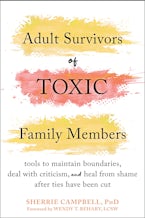By Sherrie Campbell, PhD, author of Adult Survivors of Toxic Family Members
What is toxic shame? It’s a poisonous mixture of painful feelings, including but not limited to regret, overwhelming apprehension, self-hate, humiliation, or feeling a complete lack of worth or personal value. Symptoms of toxic shame can influence all your thoughts, feelings, interactions, and behaviors.
These symptoms include
- Low self-esteem and constant self-criticism
- Feelings of chronic worthlessness
- Self-sabotage
- Chronic and compulsive people-pleasing
- Feelings of irrational guilt over things you are not guilty of
- Angry, defensive, pleasing, or avoidant behavior
- Settling for less than you want in career, relationships, and so on
- Impostor syndrome (If people knew who I really am, they would not like me)
- Dysfunctional relationship patterns
- General suspicion or mistrust of people
- Shame anxiety—the chronic fear of being shamed
Sadly, shame is powerful enough to block you from experiencing the most beautiful emotional states life has to offer, such as trust, contentment, joy, freedom, love, fulfillment, creativity, and happiness. But I can tell you from personal experience and also from the healing I have witnessed in clients, toxic shame can heal. We can become whole in who we are.
Toxic Shame is Healed by Understanding Wholeness
The desire to experience a sense of wholeness is a natural and instinctual longing fundamental to the human experience. The concept of wholeness, however, is often misunderstood. Wholeness does not mean living in a perpetual state of well-being, happiness, balance, acceptance, peace, or love. That’s utopia. Feelings of balance, peace, and happiness are wonderful, but they make up only part of what it means to be whole. Wholeness, by definition, means having all the proper parts or components. To live from the wholeness of who you are, you must assimilate not just the good, but also the hard, sad, mad, scared, and angry aspects of who you are. Authentic wholeness includes the good and the bad, the resentments and the gratitude, the broken and the healed, the pretty and the ugly, the love and the pain.
Moment of Insight: You deserve to be loved, especially in your less-than-perfect moments.
When you break down the concept of wholeness, it implies substance. Wholeness expresses the nakedness of your humanity. The greatest desire most of us have as human beings is to be loved for who we are as whole person, rather than loved exclusively for whatever about us is more pleasing or desirable. But if you are only pleasing and desirable, you are not whole. You are presenting a partial and manufactured self.
Your Manufactured Self
Shame creates your manufactured self. Your manufactured self is experienced as a sadness or fear that brings on overwhelming emotional states of emptiness, futility, impoverishment, and loneliness. To find your way to wholeness, you can start unpacking this manufactured self you had to become to survive. To secure love, you had to pretend to be who and what you thought you were supposed to be, knowing that the rules on this would change from minute to minute based on the constantly shifting and unpredictable needs of your destructive family members. Because the abuse and manipulation were present from the very start of your life, you have never been given the opportunity to develop into the person you would have naturally become had you been raised in a healthier environment.
Take a Moment for You: Reflect on how you have become a manufactured self: the part of you that becomes what you think others want at the expense of your true desire. You get the chance to figure out who you are only when you are no longer connected to the poison of the family that compromised your well-being and personal development. However, even when you start living on your own, it is normal to habitually live subconsciously under their rule. You live trying to be good enough for everybody but yourself. The fears of what other people think and whether they approve of you can keep you a prisoner to being a pleaser: your manufactured self.
Fear of What Other People Think
To fear what other people think and how they will react when you tell them how you feel about them is second nature to you, coming from an emotionally abusive background. In a toxic family, you are ostracized and rejected for such honesty. Because this was your norm growing up, it makes sense that as you start the healing process, you will likely go through tortured internal emotional gymnastics, trying to make your communication with the important people in your life perfect to safeguard yourself from losing their love. I used to be so afraid to communicate with people I would feel physically sick beforehand. I had no experience or vision of conflict between myself and others ending in a place of mutual understanding. Conflicts in my upbringing always ended with my rejection.
Understandably, expressing your needs or concerns can become so scary that you end up not telling anyone at all. The sad thing is, this does not allow you to be seen, nor does it allow others to know what you need or how they can help.
Moment of Insight: Going against your authenticity causes you to live in resentment, while others have no idea you are even suffering.
Sherrie Campbell, PhD, is a licensed psychologist who specializes in helping healthy people cut ties with the toxic people in their lives. She is a nationally recognized expert on family estrangement, an inspirational speaker, former radio host of the Dr. Sherrie Show on BBM Global Network and Tune-In Radio, a social media influencer, and a regularly featured media expert.



 Part 2: What to Do When a Client Is Participating in Self-Judgment?
Part 2: What to Do When a Client Is Participating in Self-Judgment?